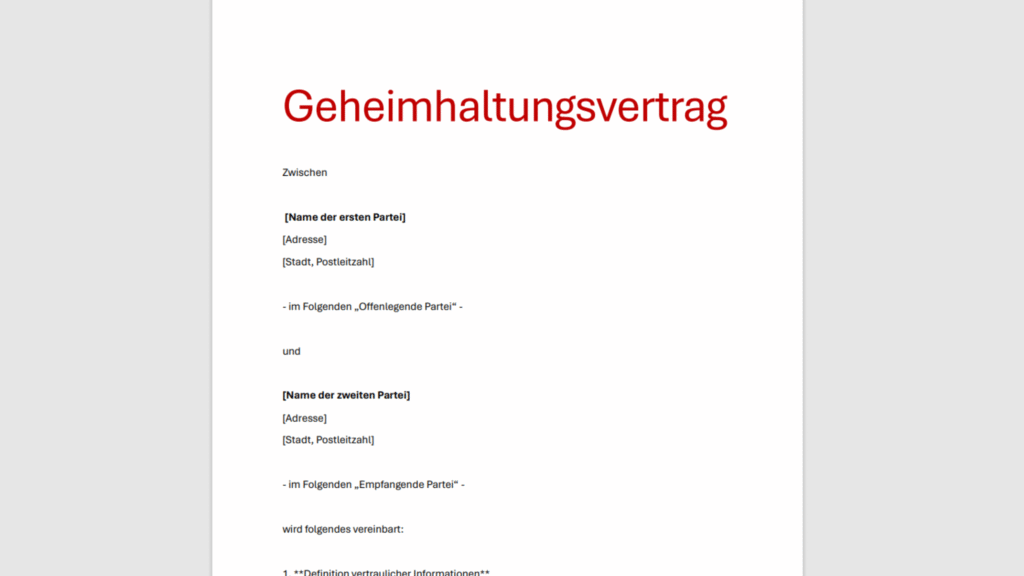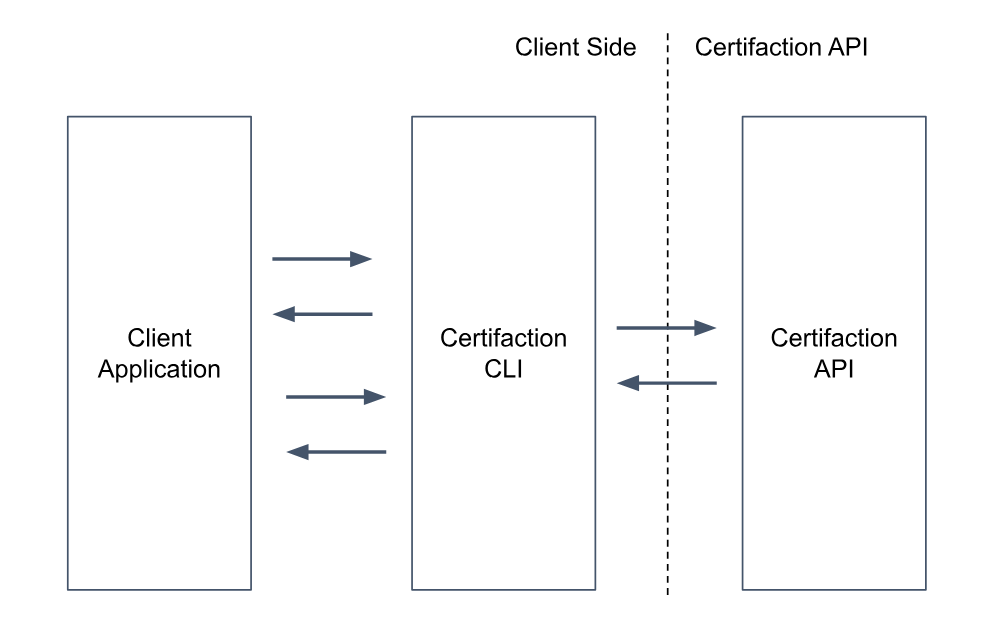In a world where trade secrets and innovation are the foundation of business success, non-disclosure agreements (NDAs) play an indispensable role. NDAs, also known as non-disclosure agreements or confidentiality agreements, provide a solid basis for the protection of confidential information between several contractual partners.
In this article, we look at the need, legal framework and best practices for the use of non-disclosure agreements.
What is an NDA and why is it important?
A non-disclosure agreement is a legally binding contract between two or more parties entering into a business relationship that prevents the disclosure of confidential information. This can be the case, for example, in negotiations or in co-operation between companies. Both contracting parties are obliged to maintain confidentiality with regard to the information declared as confidential.
An NDA therefore ensures that sensitive data, ideas, inventions or trade secrets do not fall into the wrong hands. These agreements are essential to protect the integrity and competitive advantage of a company. The parties are bound by the non-disclosure agreement and a breach can have legal consequences.

Non-disclosure agreement between two parties
Areas of application of confidentiality agreements
An NDA offers protection for your company: whether in the early stages of a partnership, when hiring new employees or in the development phase of a new product. They are an indispensable tool in negotiations whenever information needs to be exchanged but there is no contractual or long-term agreement in place. This is because non-disclosure agreements oblige companies to protect intellectual property and trade secrets and also ensure confidentiality when working with external service providers.
Non-disclosure agreements are used particularly frequently in the negotiation phase between two or more companies that want to start a collaboration of any kind. There is no formal agreement yet, but the companies already want to exchange information about projects, processes, patents or ideas.
But even if a company is looking for investors and wants to disclose data during contract negotiations, an NDA is advisable. Even after winning investors, most companies sign a non-disclosure agreement to prevent the contents of investor discussions from becoming public.
Legal aspects of non-disclosure agreements
NDAs legally oblige the contracting parties to maintain confidentiality. They stipulate which information is considered confidential, how this information must be protected and what the consequences are if the agreement is breached. A breach can lead to claims for damages.
The non-disclosure agreement should not only protect a company’s trade secrets and operational information, but also minimise potential damage caused by unauthorised disclosure and even stipulate specific penalties for non-compliance. This is because the existence of a company may well be at stake. It is essential that the NDA is precisely formulated in order to guarantee legal protection.
Good to know: Freedom of contract applies to an NDA. The contracting parties can decide whether or not a contract is concluded at all and who becomes a contracting party.
Duration and commitment
The duration of a non-disclosure agreement can vary. Some NDAs are valid for a specific period of time, while others are valid until the information is made public or for an indefinite period of time. However, the obligation to maintain confidentiality usually extends beyond the term of the agreement. All parties who have access to the confidential information are bound by the NDA. Sharing this information with third parties without explicit consent is typically prohibited.
Contents of an NDA
An effective NDA contract should clearly define (at least) the following points:
- What information is considered confidential?
- What are the exceptions?
- What is the duration of the confidentiality obligation?
- What are the rights and obligations of the parties?
- What are the consequences of breaching the agreement?
In addition, rules on the return or destruction of confidential information after termination of the agreement should be laid down.
Types of NDAs
There are two main types of confidentiality agreements: unilateral and bilateral.
Unilateral NDAs protect the information disclosed by one party to another, while bilateral or reciprocal NDAs protect the exchange of information between the two business partners.
GeschGehG and NDAs
Non-disclosure agreements are a means of effectively utilising the German Trade Secrets Protection Act (GeschGehG). The law provides a clear framework for the protection of trade secrets.
The GeschGehG provides the legal framework for challenging the breach of a non-disclosure agreement in court. If the business partners have signed the NDA, then on the one hand there is an indication that appropriate measures have been taken to protect the information and, secondly, that it has been precisely defined which information is worthy of confidentiality.
The NDA is therefore the practical measure that ensures that a legal claim exists later.
Reasonable contractual penalty
A contractual penalty is usually also stipulated within the NDA. This serves more as a deterrent against breaching the agreement. The amount of the contractual penalty should be appropriate and reflect the potential damage that may result from the disclosure of confidential information. The injured contractual partner thus receives compensation in the event of a breach of contract.
Advantages and strategic application
The strategic use of NDAs can have a significant impact on business success. They offer security in the disclosure of innovations and support a trusting collaboration between the parties. The careful drafting of an NDA can make a significant contribution to minimising risks and protecting business interests.
Important fields of application and industries
NDAs are important in almost all industries, especially in areas such as technology, pharmaceuticals, finance, consulting and anywhere else where innovation and trade secrets play a role.
Sign in paper form or digitally?
So how do you sign an NDA in your day-to-day business? Most companies have already switched to digital signatures – regardless of whether they use eSigning integrated into their software or a web service.
In the B2B world, an advanced electronic signature is usually used, but if the NDAs concern patents or highly secret ideas, a qualified electronic signature can also be used, in which the signatories must clearly identify themselves.
The digital signature is set quickly, media disruptions such as printing on paper and sending by post are avoided and the process is completed quickly and cleanly.
In addition, a digital signature offers more protection than a printout, which could theoretically fall into anyone’s hands.
Protect the data in your non-disclosure agreement
If you are concerned about the data in the NDA documents, then look for a reliable eSignature provider that protects your sensitive data professionally.
Certifaction already encrypts your documents on your end device and transmits your documents and data fully end-to-end encrypted.

Zero Document Knowledge with Certifaction API
Not even the eSigning provider Certifaction itself has access to the documents, which means that even a potential attacker has no insight into the content of your documents. This privacy-first approach protects your most confidential information sustainably and securely.
Digital Twin
If you are concerned that the NDA could be changed at a later date, there is a solution for this too: the innovative Digital Twin feature protects documents from subsequent changes and makes them immediately visible in the review.
Using a QR code, the document can be easily checked in printed or electronic form and compared with the original. This makes documents completely forgery-proof.
Conclusion: The value of NDAs
NDAs are an indispensable tool for protecting confidential information. They allow companies to share and develop their ideas and innovations in a secure environment. In an era where data is considered the new gold, NDAs provide a necessary safeguard to maintain competitive advantage and protect the integrity of business endeavours.
Protect your company with NDAs and protect the content of your NDAs with the right eSignature tool.
Contact us and we will discuss everything else during a personal consultation.


